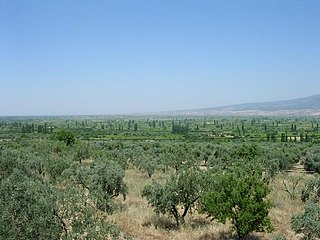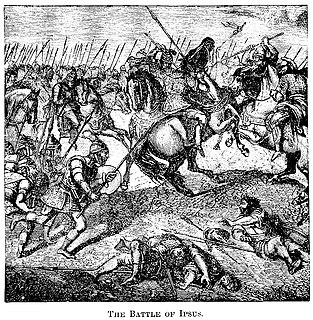 W
WThe Battle of Byzantium (Byzantion) was a battle in the wars of the successors of Alexander the Great between the general Antigonus Monopthalmus and Cleitus the White. It was a two-day-battle fought near Byzantium at the Hellespont in 317 BC and resulted in a stunning Antigonid victory.
 W
WThe Battle of Corupedium, also called Corupedion or Curupedion was the last battle between the Diadochi, the rival successors to Alexander the Great. It was fought in 281 BC between the armies of Lysimachus and Seleucus I Nicator. Lysimachus had ruled Thrace for decades and parts of western Asia Minor (Turkey) ever since the Battle of Ipsus. Recently he had finally gained control over Macedon. Seleucus ruled the Seleucid Empire, including lands currently covered by modern eastern Turkey, Syria, Lebanon, Israel, Iraq, and Iran. Almost nothing is known about the battle itself save that Seleucus won the battle. Lysimachus died during the fighting. According to Memnon of Heraclea's History of Heraclea Pontica, Lysimachus was killed by a javelin thrown by Malacon, a Heracleian soldier serving under Seleucus.
 W
WBattle of Gabiene was the second great battle between Antigonus Monophthalmus and Eumenes, two of Alexander the Great's successors. The battle was fought near Gabiene in Persia in 315 BC and ended the Second War of the Diadochi. It established Antigonus as the most powerful of the successors.
 W
WThe Battle of Gaza was a battle of the Third war of the Diadochi between Ptolemy against Demetrius.
 W
WThe Battle of the Hellespont took place in 321 BC between the armies of Craterus and Neoptolemus against Eumenes.
 W
WThe Battle of Ipsus was fought between some of the Diadochi in 301 BC near the town of Ipsus in Phrygia. Antigonus I Monophthalmus, ruler of Phrygia, and his son Demetrius I of Macedon were pitted against the coalition of three other successors of Alexander: Cassander, ruler of Macedon; Lysimachus, ruler of Thrace; and Seleucus I Nicator, ruler of Babylonia and Persia. Only one of these leaders, Lysimachus, had actually been one of Alexander's somatophylakes, that is "body guards."
 W
WThe Battle of Paraitakene was a battle in the wars of the successors of Alexander the Great between Antigonus I Monophthalmus and Eumenes. It was fought in 317 BC.
 W
WThe siege of Rhodes in 305–304 BC was one of the most notable sieges of antiquity, when Demetrius Poliorcetes, son of Antigonus I, besieged Rhodes in an attempt to make it abandon its neutrality and end its close relationship with Ptolemy I.
 W
WThe naval Battle of Salamis in 306 BC took place off Salamis, Cyprus between the fleets of Ptolemy I of Egypt and Antigonus I Monophthalmus, two of the Diadochi, the generals who, after the death of Alexander the Great, fought each other for control of his empire.